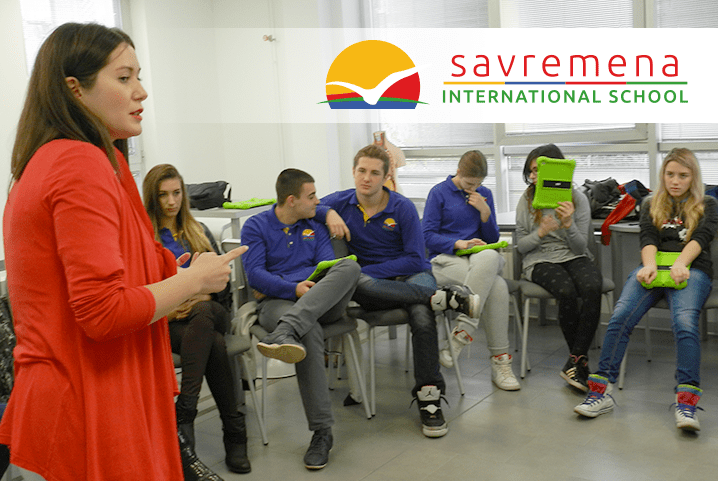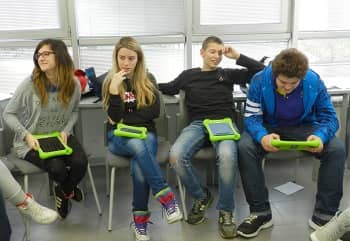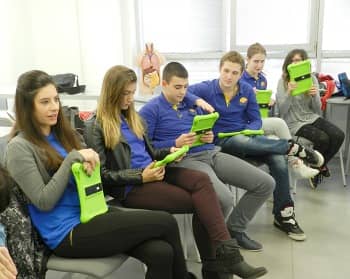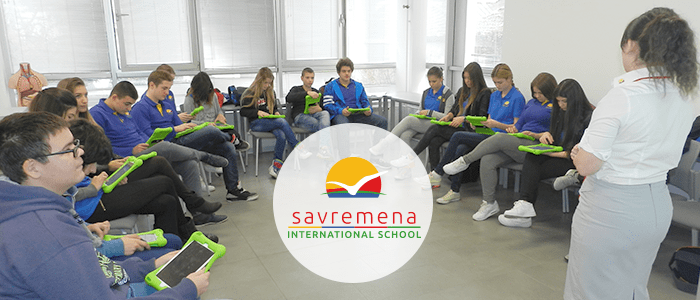
The International Day of Tolerance is celebrated on 16th of November globally. Consequently, the entire week in Savremena International School was dedicated to this topic.
Why do we celebrate the International Day of Tolerance?
The grounds which make us different from each other have no significance whatsoever. If we are tolerant and willing to show conscious tolerance for those who are different from us, it would be possible for all of us to live ‘under the same roof’ regardless of our religious, political or intellectual differences.
This is exactly what the school’s learning support consultant, Tijana Rajić, and the school’s psychologist, Vanja Miajlović, aimed at explaining to the students of Savremena International School at the workshop they organised on this occasion. The goal of the workshop was to clarify and illustrate what makes stereotypes and prejudices about other people.
How did the workshop help our students?
 The students were asked to consider with whom they would share their train cabin the most during a trip from Lisbon to Moscow. The task, based on a practical example, made the students think about the level of tolerance or intolerance they show to others.
The students were asked to consider with whom they would share their train cabin the most during a trip from Lisbon to Moscow. The task, based on a practical example, made the students think about the level of tolerance or intolerance they show to others.
The students showed the least tolerance towards a young artist who happens to be HIV positive, a Romani person from Hungary, who had been just released from prison, and towards a middle-aged Rumanian woman, travelling without visa and carrying in her arms a year-old child. On the other hand, a Serbian soldier from Bosnia, as well as a skinhead from Belfast, who was apparently on his way to a football match, seemed like a good company for the journey.
After these results, both the psychologist and the learning consultant initiated a dialogue with the students which consisted of discussing different reasons that students had in mind when choosing their travel companion.
In this way, the students were able to analyse further their understanding of tolerance through conversation and dialogue while at the same time they grasped their own level of tolerance or intolerance of other groups or ethnic minorities. Owing to the fact that most of them showed intolerance towards the young artist from the task who was HIV positive, the school has scheduled another workshop for 1st of December, i.e. for World AIDS Day, which will take place during biology lesson.
Learning through examples
 All this was supported by examples that were connected to the curriculum. Hence, during their history lesson the students watched a movie on social darwinism, while in Serbian lessons they explained the notion of tolerant, i.e. intolerant using various literary characters as examples. They discussed which actions by these literary figures made them characterise some of them as tolerant and others as intolerant.
All this was supported by examples that were connected to the curriculum. Hence, during their history lesson the students watched a movie on social darwinism, while in Serbian lessons they explained the notion of tolerant, i.e. intolerant using various literary characters as examples. They discussed which actions by these literary figures made them characterise some of them as tolerant and others as intolerant.
The students found particularly interesting the example given by their business teacher, Tatjana Vilček, which contained the following scene: a father and his son are sitting in a park; the son is trying to read a newspaper, but the father constantly keeps asking him what that is pointing at a bird. After hearing the same question for the third time, the son gets angry and starts yelling at his father.
Then the father gets up and brings his diary in which he had written down that when his son was a little boy he would ask him one and the same question over and over again and each time the father would patiently offer him an explanation. The students could easily identify with this example as it evoked similar situations from their own childhood.
Mastering communication skills
Tolerance is an important issue in a contemporary world. It is our ability to show tolerance that shapes the world we live in. There is no doubt that in order to create a world without violence, a world of mutual respect for difference and divergence, it is necessary to raise awareness of the importance of tolerance. This fact is corroborated when studying leading religions and state laws which stress out the right to a different opinion and the importance of respecting the other.
It is important for students to learn while they are still adolescents what tolerance is and how the latter can help them master their communication skills.
You can see pictures in our gallery.


















